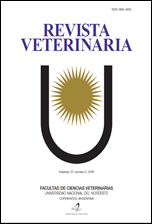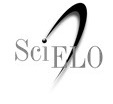Effect of growth hormone on semen parameters, partial hemogram, and testosterone level in Nili Ravi buffalo bulls
DOI:
https://doi.org/10.30972/vet.2721086Keywords:
Buffalo, somatotropin, semen, blood, testosteroneAbstract
The purpose of this trial was to examine the possible effects of exogenous growth hormone (GH) on semen quality, hematological variables and serum testosterone concentration in Nili Ravi buffalo. Bulls of the treatment group (n=3) were injected with recombinant GH 500 mg in a 15 day interval for 10 consecutive weeks, while bulls of control group (n=3) received equal volume of normal saline solution. Semen samples were collected twice per week and analyzed for physiological parameters. Blood samples collected fortnightly were analyzed for red blood cells count (RBC), hemoglobin concentration (Hb), packed cell volume (PCV), mean corpuscular volume (MCV), white blood cell (WBC), neutrophils, lymphocytes, and serum testosterone levels. Data were analyzed statistically using t-test. Results indicated that GH treatment of Nili-Ravi buffaloes significantly (p<0.05) increased ejaculatory volume (8.8±0.2 vs 7.7±0.2 ml), sperm motility (72.6±0.4 vs 67.4±0.7%), mass activity (3.35±0.07 vs 2.52±0.08), sperm concentration (982.2±67.8 vs 731.9±50.5 million/ml), live sperm (80.1±0.3 vs 75.8±0.5%) and serum testosterone (4.02±0.21 vs 2.37±0.07 ng/ml) compared to control bulls. Among hematological variables, lymphocytes were increased (p<0.05), but MCV, WBC count, and neutrophils decreased (p<0.05). Hb, RBC and PCV remained unchanged. However, values of these variables were within normal ranges for buffalo bulls. In conclusion, treatment of Nili-Ravi bulls with GH improved semen quality and increased serum testosterone without ostensible adverse effects on the general state.Downloads
Downloads
Published
How to Cite
Issue
Section
License
Copyright (c) 2016 Revista Veterinaria

This work is licensed under a Creative Commons Attribution-NonCommercial 4.0 International License.
Revista Veterinaria (Rev. Vet.) maintains a commitment to the policies of Open Access to scientific information, as it considers that both scientific publications as well as research investigations funded by public resources should circulate freely without restrictions. Revista Veterinaria (Rev. Vet.) ratifies the Open Access model in which scientific publications are made freely available at no cost online.











.jpg)
.jpg)



